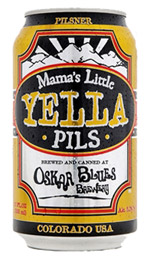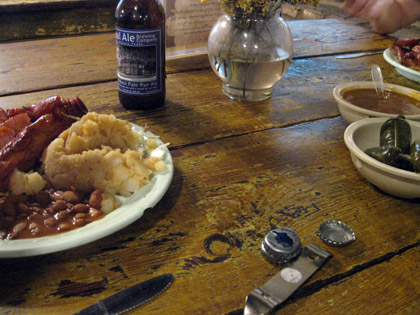Maybe the rest of the world will forsake pale lagers, but that’s hard to imagine in Texas. We’re only a few days into April and it’s already getting plenty hot. When we headed to Threadgill’s yesterday for a bunch of vegetables I could only imagine ordering one beer — Live Oak Pilz on tap.
 But today, assuming the clouds I’m looking at right now go away, when we spend a few hours boating it won’t be with Pilz in hand. Live Oak doesn’t package its beer.
But today, assuming the clouds I’m looking at right now go away, when we spend a few hours boating it won’t be with Pilz in hand. Live Oak doesn’t package its beer.
(Yes, responsible boaters don’t drink and drive, but we’ll only be passengers.)
So should I go with beer from a bottle, Saint Arnold’s Fancy Lawnmower, or from a can, the new Mama’s Little Yella Pils from Oskar Blues in Colorado? Sorry, Mama, when there’s a good local alternative the rules of our trip make it easy to pick the beer brewed nearby.
I tell you what, though, I’m wondering why Oskar Blues didn’t hit on this idea before. Hot weather, and cold pilsner in a can makes for one fine match. (In fact, the answer it pretty simply. Since first packaging Dale’s Pale Ale at the end of 2002 the brewery has struggled to keep up with production.) Although, like the brewery’s other beers, Mama’s Little Yella Pils packs a lot more aroma and flavor when you drink it from a glass rather than straight from the can.
Both Live Oak Pilz and Mama have the pleasant grainy/grassy qualities I associate with a pale lager from the Czech Republic. And the all-malt flavors that, let’s be honest, many drinkers think interfere with drinkability. Not you, right?
Not the same as sitting in Domažlice and drinking Pivovar Kout na Šumav? 10°. But in a boat. From a can. This is progress.
